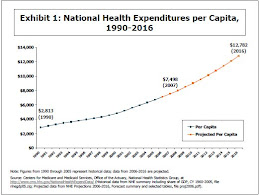In attempting to rectify our nation's dire health care problems, it is necessary to view the problem from all sides. It is not simply due to one factor such as technology or inefficiencies in the system, but a consolidation of all of these individual factors into one gargantuan problem. For instance, what good is the development of a state of the art MRI machine if a large proportion of the population cannot even afford the luxury of being able to see a primary care physician? As wonderful as developments in science and technology are, it seems that the amount of emphasis that has been given to these areas has been too much since the biggest problem our country's health care system faces deals with insuring as many people as possible, which is a problem that cannot be rectified by continually allocating funds towards any other resources other than the Medicare and Medicaid programs. As more and more citizens are becoming unemployed and eventually, uninsured, we can only expect to see the cost of health care skyrocket in the years to come.
As a result of these skyrocketing costs, business and families are going to continue to suffer. Without the ability to maintain one's health, they also lose the ability to make a living for themselves and their families. Once more and more people begin to skimp on preventive services or routine checkups and feel the need to only resort to hospital visits for emergent cases, it is likely we will see the number of people who comprise our healthy and capable workforce dwindle. If people cannot stay healthy, they cannot work. It's as simple as that.
Considering the current state of our economy it is even more important now that the government be able to prioritize what exactly the funds in the stimulus package will be disbursed to. Less money should be allocated to advancing technology if we cannot even provide basic care to the neediest patients. In addition, I believe that the prioritization of funds would benefit by borrowing from the 80-20 rule, which basically says that 80% of any specific effects comes from 20% of the causes. Adapting this rule to the health care reform plan, it seems that focusing on helping the lowest 20% that are in need of health care financial assistance will help to alleviate up to 80% of the problems we are currently facing today. Thus, I believe that our whole nation would benefit tremendously by allowing health care to be accessible and affordable to everyone, or as it's better known as, Universal Health Care.
Tuesday, January 27, 2009
Subscribe to:
Post Comments (Atom)

No comments:
Post a Comment